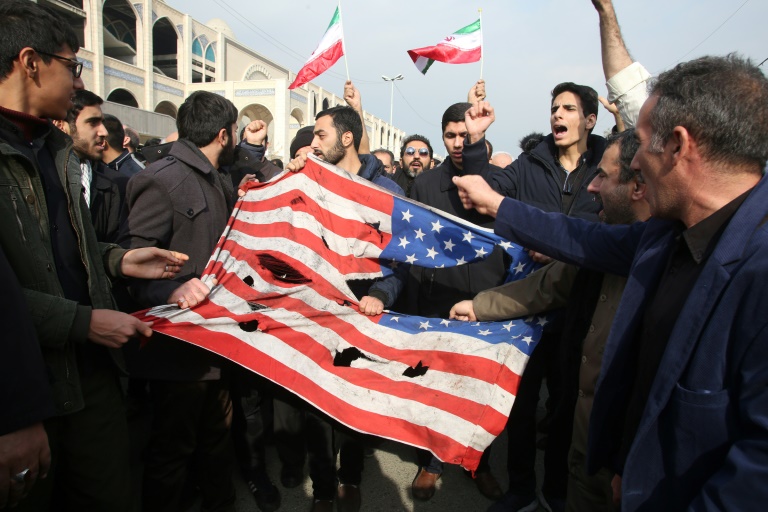Iranians tear up a U.S. flag during a demonstration in Tehran on January 3, 2020 following the killing of Iranian Revolutionary Guards Major General Quasem Soleimani in a U.S. strike in Baghdad
by Matteo Rando
On January 3rd a U.S. drone strike killed Quasem Soleimani, Major General of the Islamic Revolutionary Guard Corps (IRGC) and Commander of the Quds Force, a particularly strong division specialized in unconventional warfare and military intelligence. Soleimani has been killed with other 5 people, one of them being Abu Mahdi al-Muhandis, an Iraqi politician and military commander. The strike hit while the two of them were at Baghdad International Airport.
Soleimani was one of the most important people of the Iranian regime, second only to the Supreme Leader of Iran Ali Khamenei. During his 40-years-long military career, he acquired enormous influence becoming the main designer of the Iranian influence-spreading strategy through the Middle East. He had been able to enormously increase Iranian Shia influence and interests in Iraq, Syria, Lebanon, Yemen, and Bahrein. He has been on the U.S., Israeli and Saudi Arabia intelligence radar for years, and all of them knew how powerful and dangerous he was. But no one ever ventured to kill him because of the obvious retaliation consequences by Iran. The increasingly unpredictable Trump administration, however, decided for the strike.
President Trump’s choice remains extremely difficult to evaluate at the moment, but it is clear that the potential negative consequences are enormous. Iran considered the strike an act of war and Iraq strongly condemned it stating that it violated its territorial sovereignty. The European Union and many other global actors condemned the violent escalation, with the important exception of Boris Johnson’s UK. Technically speaking the U.S. attack was a success and proved once again its extreme military power and precision. However, some judicial criticalities emerged. Since 9/11 all the U.S. Presidents tended to increase their military initiative powers, sometimes at the constitutional limit and overcoming the Congress. But this time Trump’s justification of the act seems particularly weak: the U.S. administration ambiguously said that “the goal of the operation was to discourage attacks planned by Iran”.
Interviewed by Foreign Policy Devid Petraeus, former commander of U.S. forces in Iraq and Afghanistan and a former CIA director, advance an interesting point about deterrence power towards Iran. He said that “after months of a muted U.S. response to Tehran’s repeated lashing out—the downing of a U.S. military drone, a devastating attack on Saudi oil infrastructure, and more—Suleimani’s killing was designed to send a pointed message to the regime that the United States will not tolerate continued provocation”. He continues explaining that the current economic and political weakness of the theocratic Iranian regime may limit its feared response.
Petraeus proved to be right about the Iranian military response: after extremely worrying and though announcements by Iran, its response has actually been very limited. On January 8th Iran launched ballistic missiles to 2 U.S. military bases in Iraq, Erbil, and Asad. The Iraqui government has previously been informed, and most likely the U.S. one too. No casualties and limited damages followed. Even if Iran proved to dispose of strong and precise military capacity, Trump has been able to claim almost total success.
On the contrary, Petraeus is wrong about the internal political weakness of Iran. The killing of Soleimani, in fact, immediately end months of Iranians protesting against the regime because of the economic crisis they were living. Instead, billions of Iranians reversed on the streets to honor their most loved general. His killing by the U.S. united the Iranians against its “devil-like” enemy. Images of young Iranians burning U.S. flags and calling for Trump’s and America’s death are everywhere one again.
Iran also declared its intention to completely suspend the Iran Nuclear Deal, but the intention was already known right after the dramatic decision to withdraw by President Trump in May 2018. The deal, reached in 2015, was world-wide considered a diplomatic success of the U.S., the European Union and Iran itself in order to partly normalize Iranian relationships with the West.
The last development of this critical events succession, seen President Donald Trump during his last press conference about Iran relatively composed. Compared to the norm, he used rational and measured tones, stating that the U.S. will respond only if new military actions will be taken by Iran. Trump assured that the U.S. does not want a violent escalation either and that future talks with Iran on distention may take place. We will only be able to see if these words can be considered meaningful in the next weeks and months.
Aggravating this already dramatic time, few hours after the Iranian retaliation actions against American bases, a Boing 737 aircraft taking off from Teheran International Airport crashed killing all 176 passengers and crew. The Ukraine International flight was heading to Kyiv, but it crashed a few minutes after its departure. Initially, a technical fallacy causing the failure of the engine was plausible, but a new dramatic hypothesis is emerging. A few hours ago, Canadian Prime Minister Justin Trudeau declared that there is clear evidence from Canadian and U.S. intelligence on one or more Iranian land-air missiles hit the aircraft. 63 of the 176 passengers were Canadian citizens. Trudeau added that it was a “possibly not intentional” action by Iranians. Further investigations are ahead.
In the meanwhile, the European Union is showing once again its structural weakness on foreign-policy matters. Even if new Commission’s President Ursula von der Leyen on her first days in office announced, “a new geopolitical Commission”, the EU has not been able to adequately react to the unexpected escalation between U.S.A. and Iran. Besides High Representative Josep Borrell’s call for moderation, a much greater effort towards EU’s foreign-policy construction appeared more needed than ever.

